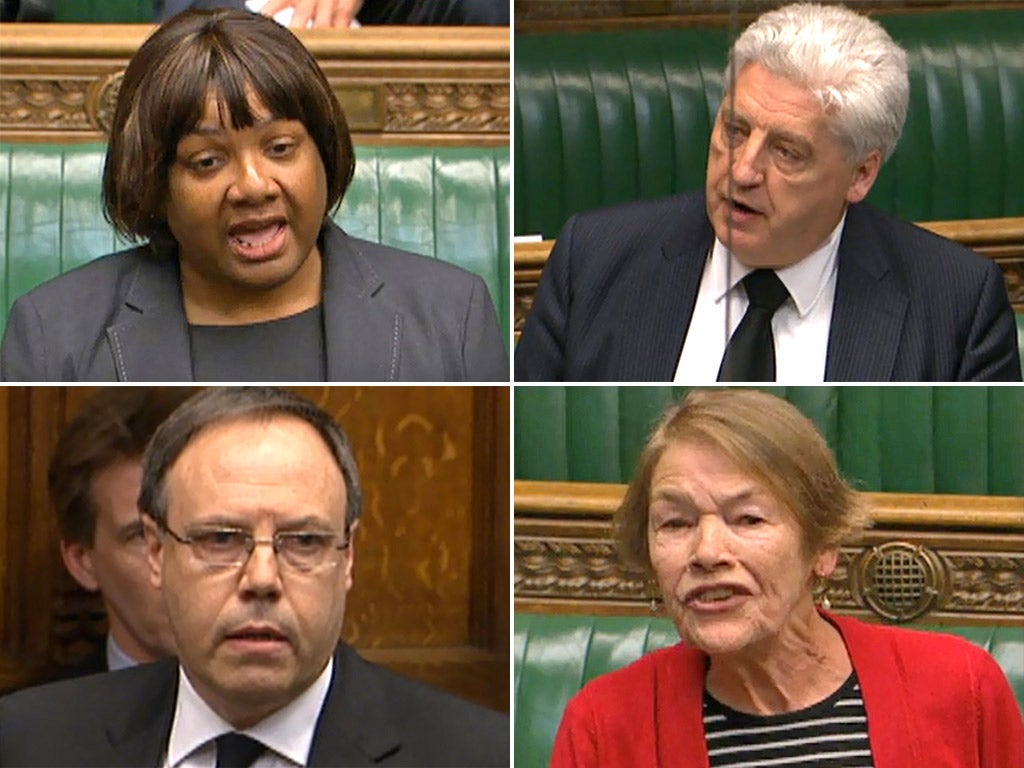Commons tributes to Thatcher: They came, they gushed, they left no cliché unturned
Donald Macintyre on the day Parliament was recalled to give its final verdict on the Iron Lady


If Margaret Thatcher really was, as David Cameron said, "a great parliamentarian" who "loved and respected this place and was for many years its finest debater", she would surely have been somewhat underwhelmed by the Commons session devoted to her memory. And as someone who kept a sharp eye on public expenditure throughout her premiership, might even have wondered whether it was worth the taxpayer-funded payments to MPs for the trouble of attending.
Maybe it was a mercy that several factors conspired to prevent the occasion morphing into that somewhat queasy-making creature – the House of Commons at its best. It was not simply that almost no cliché was left unturned either by her supporters or detractors: "Enormous contribution"; "We shall not see her like again"; and "heinous legacy". Or the extravagance of the claims made by some on her behalf – for example that she more or less single-handedly, as the Tories' Cheryl Gillan (surprisingly the first woman to speak and that after nearly two hours) put it, "engineered the end of the Cold War."
For one thing it went on too long. At times it was rather like one of those wakes where the mourners begin by reminiscing about their relative with due solemnity and then as the whisky starts to flow end up coming to blows as they revive various suppressed family feuds.
Even Labour's Gerald Kaufman, in a warm personal – if not largely political – tribute, took a sideswipe at the late Michael Foot for the "help" he gave Mrs Thatcher in her 1983 election victory. Glenda Jackson, perhaps seeking the third Oscar of her career by playing the black sheep aunt determined to spoil the party, performed a Clytemnestra–like denunciation of the late Prime Minister. "A woman? Not on my terms," she said. The Tories' Sir Tony Baldry rose to ask the Speaker whether it was in order to "denigrate the memory of the person who has been deceased". But Speaker Bercow assured him that "nothing unparliamentary" had occurred.
Sir Tony's own encomium included a persuasive explanation of the Thatcher journey from convinced European to arch sceptic. But even he ended his ringing peroration by quoting her "U turn if you want. The Lady's not for turning" as if anyone with even passing exposure to a radio or television set had not heard the lady herself saying it a hundred times since Monday morning.
The relevant Standing Order suggests that Parliament should be recalled if the "public interest" requires it. And certainly there was a better case for the debate than there was when the Queen Mother died during a recess in 2002. But you couldn't help feeling that the main interests served were those of the two main party leaders. For Cameron it was an opportunity – which he elegantly took though – to show proper respect to the leader whose political assassination 23 years ago still haunts his party. And for a statesmanlike Ed Miliband, who like Thatcher had not been the favourite to become Opposition leader, a chance to clasp the mantle of "this unique and towering figure" who believed that believed that "ideology mattered. Not for her the contempt sometimes heaped on ideas and new thinking in political life." Was this a subliminal rebuke both to the Blair era and those of his colleagues who think he is too much of an intellectual?
To be fair there were speeches – despite a certain "that's enough about Mrs T, let's talk about me" tendency among some backbenchers – in which her inimitable style did resonate. Miliband himself recalled her saying in 1965: "In politics if you want anything said, ask a man. If you want anything done, ask a woman". On the vexed question of whether she had a sense of humour her former Cabinet Minister Malcolm Rifkind remembered her being asked if she believed in consensus, and replying that she did: "There should be a consensus behind my convictions". Rifkind added: "I thought at the time that this was an extraordinary example of wit, but as the years have gone by I have realised that she was actually being deadly serious."
The Tory backbencher Conor Burns, recounted how on one his regular Sunday evening visits to her Belgravia home in recent years he had been told by an admiring taxi driver :"You tell her we haven't had a good one [prime minister] since". To which his hostess had replied "Well, he's quite right."
David Cameron laughed along with everyone else. But it's what a lot of his MPs still think.
Absent friends: The MPs who failed to show
Ronnie Campbell, the Labour MP for Blyth Valley, said he didn't want to hear Tory MPs heaping praise on Thatcher. "I'd rather be in a torture chamber," he said.
The former Housing minister John Healey said Baroness Thatcher's legacy was "too bitter" to warrant national mourning. "Parliament is being used by the Prime Minister as a platform for his party's ideology," he said.
Sarah Champion said her time was better spent in her Rotherham constituency: "Thatcherism tried to destroy our town and community. It failed!"
Oliver Wright
Join our commenting forum
Join thought-provoking conversations, follow other Independent readers and see their replies
Comments
Bookmark popover
Removed from bookmarks